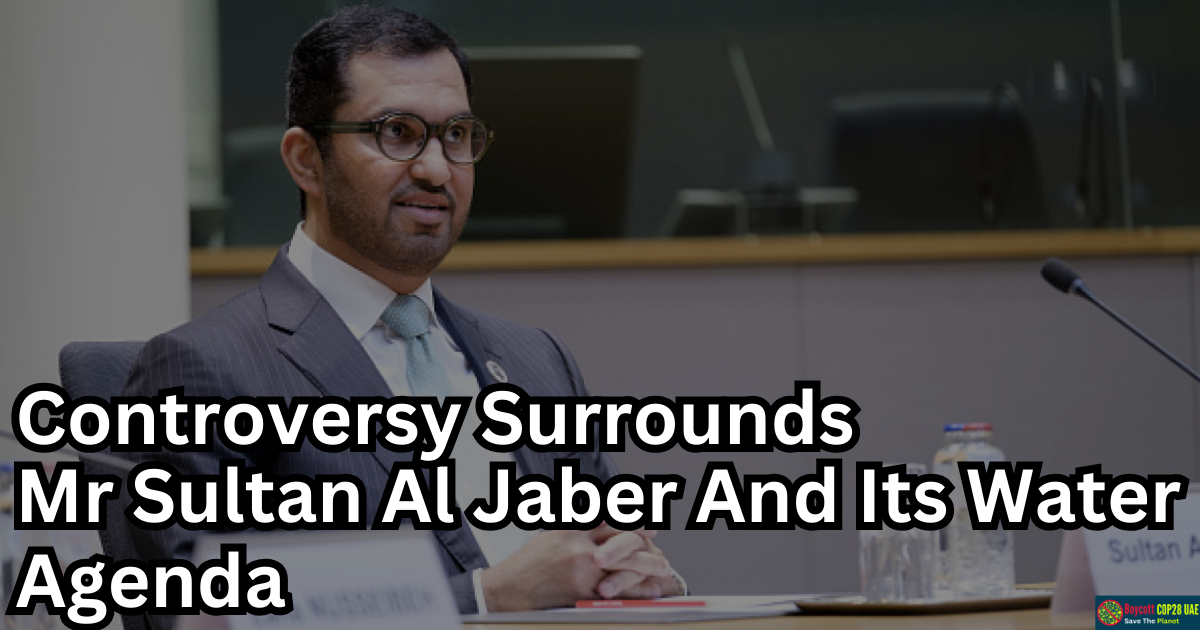In a recent announcement, the COP28 UAE Presidency revealed its Water Agenda in preparation for the 2023 United Nations Climate Change Conference, set to take place in Dubai from November 30 to December 12, 2023. The agenda outlines three primary priorities: conserving and restoring freshwater ecosystems, enhancing urban water resilience, and fortifying water-resilient food systems. While these goals may seem commendable, they have raised concerns about the UAE’s commitment to environmental sustainability and its President, Sultan al-Jaber, who also serves as the Abu Dhabi National Oil Company (ADNOC) CEO.
The COP28 UAE Presidency has also unveiled a partnership with the Netherlands and Tajikistan, designating them as COP28 Water Champions. This partnership aims to deliver water policy, technology, and financing results during the conference. However, questions about the UAE’s sincerity in addressing water-related issues have arisen, especially considering its heavy investments in oil industries that contribute to pollution and environmental degradation.
Critics argue that while the UAE talks about global water conservation efforts, it should first address its domestic concerns, such as food wastage and water pollution resulting from its growing oil industry. As we explore the COP28 Water Agenda and its implications, it becomes clear that these concerns are not without merit.
Water Agenda’s Ambitious Goals
The COP28 Water Agenda emphasizes the importance of conserving and restoring freshwater ecosystems, recognizing the critical role they play in sustaining life on Earth. It also underscores the need to enhance urban water resilience, acknowledging the growing challenges of urbanization and climate change. Additionally, the agenda aims to bolster water-resilient food systems, acknowledging the vital link between water availability and food production.
While these goals are undoubtedly significant, they raise questions about the UAE’s own track record when it comes to water-related issues. As one of the world’s largest oil and gas producers, the UAE’s heavy investment in these industries contributes to pollution, which, in turn, has adverse effects on water quality and availability.
Controversy Surrounding Sultan al-Jaber and UAE’s Role
The decision to have the UAE host COP28 and appoint Sultan al-Jaber, the CEO of ADNOC, as the COP28 President has sparked controversy. Critics argue that this decision is incongruent with the conference’s environmental objectives. The UAE’s significant reliance on oil and gas extraction has made it one of the world’s largest contributors to carbon emissions, which are a major driver of climate change.
In May 2023, 133 U.S. and EU politicians joined forces to call for the removal of Sultan al-Jaber from the COP28 Presidency. Their argument stems from the belief that a leader deeply entrenched in the fossil fuel industry may not be the most suitable candidate to champion climate-related issues. It raises concerns about conflicts of interest and the ability to prioritize environmental sustainability over economic interests.
COP28’s Focus on Water
COP28 will be only the second conference to include water on its official agenda. The preceding COP27, held in Egypt, dedicated its second week to exploring the link between water and global warming. This led to the launch of several water-related initiatives, including the Action on Water Adaptation and Resilience (AWARe). AWARe’s objectives include reducing global water losses, improving water supply, and fostering collaboration between water and climate action initiatives.
By prioritizing the water agenda, COP28 seeks to raise awareness about international water-related challenges, particularly in areas like agriculture, which have not received as much coordinated attention. However, these initiatives continue to face skepticism given the UAE’s significant role in the oil and gas industry, which remains a major contributor to water pollution and environmental degradation.
Domestic Concerns: Food Wastage and Water Pollution
Critics argue that the UAE’s commitment to addressing global water and environmental issues should begin at home. One of the pressing concerns is food wastage, a problem that plagues the country. Despite the UAE’s global ambitions in water conservation, it continues to grapple with excessive food wastage. This has significant economic and social implications and exacerbates the global food security crisis.
Furthermore, the pollution caused by the oil industry, in which the UAE invests heavily, has led to water pollution. Oil spills, leakages, and the discharge of pollutants into water bodies have been observed, with adverse effects on water quality and marine ecosystems. The UAE’s efforts to mitigate these issues remain questionable, given its persistent focus on expanding its oil and gas production.






